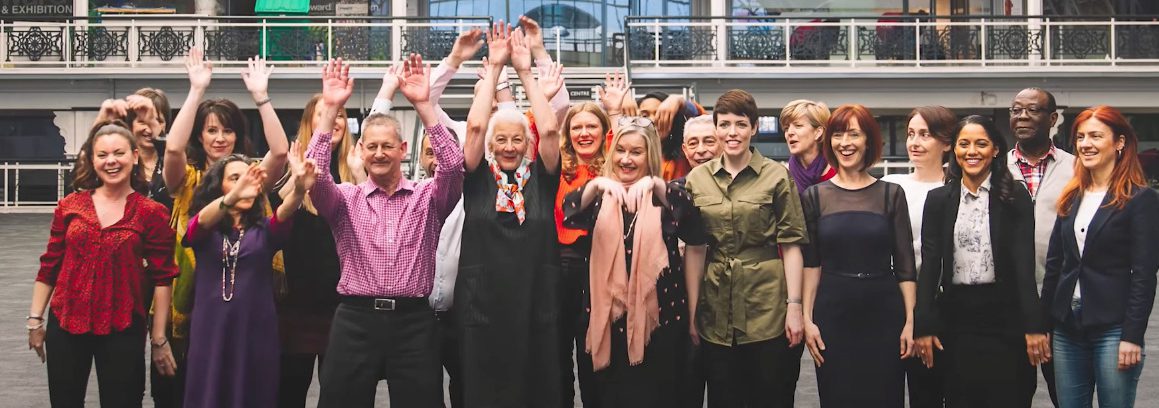
Impact Factory Explained
The only person you can change is you. However, if you change what you do, you will most likely have such an effect on other people that they will change as well.
People Skills
The two partners, Robin Chandler and Jo Ellen Grzyb, are consultants and training creatives, designing workshops, courses and events and ensuring their delivery to the client’s satisfaction.
They write books, advice columns and articles, appear on radio and television, act, and speak at seminars and special events.
What Makes Impact Factory Different
So what makes Impact Factory different from all the rest?
This is one of the best questions we are ever asked by potential clients.
It gets right to the point and tells us that we are dealing with someone who knows their way around the block and isn’t easily impressed.
That’s just how we are too.
The ordinary, the “run of the mill” and the predictable just don’t do it for us and, frankly, we prefer clients who feel that way too.
Impact Factory runs
Open Interpersonal Skills Courses
Tailored Communication Skills Training
Five-Day Intensive Communicate with Impact Course
and personalised One-to-One Executive Coaching
for anyone interested in Personal Impact and People Skills
Traditional Training
Traditional training often tends to be about doing something over and over again until people learn it (such as computer training). What people are doing wrong is identified, and then they keep doing it until they get it right.
For computer training this is good. For people skills training this can undermine the very confidence it is trying to build.
Impact Factory’s people skills, or soft skills ‘training’ seeks to develop the individual by offering options, choices, changes in perspective and attitude and an opportunity for the sort of ‘Aha!’ experience that allows people to develop quickly and radically.
Just to state the obvious: you can have the best systems, processes and measurements in place, but if people are not aligned, committed, on board and feeling confident and motivated, those systems simply won’t work. Just doing the job won’t make an exciting strategy work either. There needs to be something extra to develop peoples’ drive, dynamism and team spirit.
People must feel recognised for what they do. They also need to feel that they aren’t always to blame when things go wrong. Our personal development work will usually start with a look at what is already being done well so that people feel recognised and acknowledged for the work they do day in and day out. It creates enthusiasm for being part of a department that feels good about its output.
People have to feel able to put new behaviours into practice. If they feel they are being taught things they ‘ought’ to do, then the work will go no further than the room it’s done in. As soon as some kind of imperative is placed on the development (e.g. You must speak more slowly) it becomes a “training” and defeats the purpose of a personal development workshop. To develop better soft skills, people need to be able to identify the behaviours that work for them, what behaviours get in the way of their effectiveness and what else they could do instead.
If they are then allowed to develop their inherent skills as an individual, they will quickly get to a place where they will want to put them into practice. This is the underlying aim of all our work.
Change Yourself to Change Others
Another powerful aspect of Impact Factory’s training, which underscores our work, has to do with changing oneself to change others.
When difficulties arise, people often imagine things would be a lot better if someone else did something to change the situation. And they are right – if that happened things would be better. However, the only people we have any real power to change are ourselves.
When people accept that the only person they can guarantee to change is him or herself, they start thinking and acting from a different perspective. They start to feel more in charge of what they can do and can begin to make changes in their own behaviour, which in turn may effect change in others. They will have more choices at their disposal and they will start to see more things they can try.
We Don’t Dip Sheep
We always work on giving people an understanding of the dynamics of communication and then the opportunity to practise. We do use some theory, always backed up by a process, game or exercise to demonstrate so that delegates have a real experience rather than just a ‘head’ one.
What we don’t do is “sheep dip” – training where everyone gets the same programme regardless of who they are – and we don’t teach people “how to” do things. We recognise and respect that each person is a professional in his or her own right already. Therefore, we will look and ask them to look for what will work best. We want people to leave a workshop ready and eager to continue developing themselves, rather than leave “trained”.
If you look at the way some people skills training is done it’s no wonder it can have a bad reputation. The sheep-dip approach; large groups; all chalk ‘n’ talk and little participation; lots of “right ways”; an emphasis on what’s wrong with people; and unreal examples and exercises. Training like this is de-motivating and often does more harm than good.
About the Partners
To call Impact Factory a training company doesn’t do it justice. Everyone who works for Impact Factory comes with an eclectic background: writers, actors, psychotherapists, directors, teachers, magazine editors. They write books, advice columns and articles, appear on radio and television, act, and speak at seminars and special events.
Impact Factory partners are accessible, have an easy-to-understand approach to training and have dynamic, down-to-earth personalities. They create innovative training programmes for large and small companies; anything from one-day workshops to complex training programmes working with large numbers of people in small groups.
Established in 1990, Impact Factory specialises in interpersonal skills, relationship building, effective communication, influencing, performance management, negotiation, presentation skills, personal effectiveness, ‘assertiveness’ issues, team building, career development and dealing with change.
Our creative and consulting abilities are our strength. We listen to what a client needs and deliver tailor-made training programmes to fit those needs. Although there may be processes and exercises that are included in a number of our tailor-made training, no two programmes are ever the same. They are always designed to meet the client’s specific needs and to take into account the company’s ‘culture’ as well.
We have worked with thousands of people facilitating them to effect positive and useful change.
Key Impact Factory Principles
What goes into what we do?
Fine tuning is better than a complete overhaul.
If it’s easy people will remember and feel able to put it into practice; if it’s hard people will not only not put it into practice, they will feel worse because they’ve failed.
If you wait for other people to change to improve the situation you may have a very long wait.
The only person you can change is you. However, if you change what you do, you will most likely have such an effect on other people that they will change as well.
You may never be able to change or improve a particular situation; you may simply feel better about it.
Since the mind works differently to negative and positive input, by focusing on positive qualities and capabilities and developing those, negative ones begin to diminish.
Concentrating on what’s wrong and needs fixing takes far more effort and is far less successful than concentrating on what people do well. People are much ‘better’ at pointing out their faults and what needs improving than in talking about things they do and are that are positive. Of all the ways of working that build and reinforce confidence, this is probably the most crucial.
Telling people what’s going to happen in a process and why demystifies it and also indicates respect for the participants.
There is no right way to do things. No matter how much you wish there was, you can only practise enough different ways of doing things so that you find out what’s right for you. Furthermore, what’s right once and in one situation may not be right in other circumstances.
It’s possible for people to come out of a workshop not quite knowing what happened to them, but knowing something has changed.
When you practise something new and are successful at it, that’s a “win”. A win gives you an experience that feeds your confidence so that you can go and practise some more, etc. If you practise something new and aren’t successful, you have a de-motivating experience which erodes your confidence so that you are less likely to go out and practise again.
When we get stuck, frustrated, stressed or feel incapable of dealing effectively with certain situations, it can feel as though those difficult feelings really define who we are. In other words, the difficulty seems to be us rather than simply a difficulty. That’s why solutions can seem so hard to see, let alone put into action.
To illustrate some of this take a look at our fundamental approach to one key area:
Presentation Skills Training
It’s all right to be scared and nervous.
Nerves are to be used, not made to go away.
Your body is prepared for fight or flight.
Your head tells you off for not being better at presenting and looks for all your faults.
You are the worst judge of how you’re actually doing.
Stunning presenters are usually people who know how to recover well.
Damage limitation tries to prevent mistakes from happening, but what it really does is limit the presenter.
You can do practically anything when you’re presenting except repetition.
Gaining Competitive Edge
Most of us work under extraordinary pressure these days. Time constraints, deadlines and fewer people to do more work can mean that communication suffers, conflicts stay unresolved, tempers get frayed. Inefficiency and dissatisfaction can be the result of all this pressure.
On top of that, there is an insidious assumption that if you are good at what you do – professionally – then you will be, ipso facto, a good manager, communicator, delegator, etc. That simply isn’t true. We often see people who are highly capable in their jobs but less adept at dealing with people. They sometimes feel that because of their position they ‘should’ already be able to handle difficult situations.
Surely you only need to go on “people” courses if there is a real problem? Not true. In fact, if you wait until there’s a problem your people skills training will focus on fixing that problem.
At Impact Factory we see the need for people skills as a core skill. We aren’t looking to “fix” something that’s wrong. Rather companies come to us because they are interested in gaining a competitive edge.
Understanding how we work under pressure
Under pressure, people will “revert to type”. Normally, when there’s no pressure, everyone knows how he or she would like to deal with tricky situations. However, when the heat is on, most of us respond as we always have before. We repeat the same patterns of behaviour. It is only after the crisis passes that other options become clear.
Overnight Change
You can’t change the world overnight
When we talk about change, we are looking for simple changes; tweaks, adjustments, small alterations, rather than looking to change everything about a person. At Impact Factory we talk about the least amount of change for the greatest impact. Striving for small but effective changes rather than complete transformation.
A transformation may come, but it will be thought through, effective transformation, based on the solid foundations of the strengths and personality of the person involved.
Training and development work at Impact Factory is easy and enjoyable and filled with variety so that there is “something for everyone”. We know that what works for one person, won’t necessarily work for others. We believe the way forward is to find a few things that you know you’ll be able to do, to have fun doing them and to experience small ‘wins’ as you practise them.
These will be the things you will remember and be able to use in the heat of a difficult situation.




